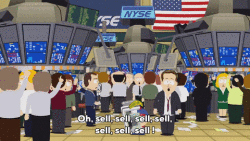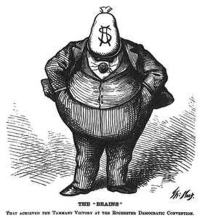
Rising stock prices, and low unemployment, have the Trump approval rating as close to 50 as it can get. He is certain to be even more unhinged, and unbound, by the Republican Senate’s refusal to even censure him for his theft so far.
Lincoln said it best. “The hen is the wisest of all the animal creation, because she never cackles until the egg is laid.”
The tide is still running out on Trumpism. Demographically, it stands no chance. In terms of issues, the same. It’s only the market that’s with him. That, too, may be about to change.
That’s because the stock market, like the housing market, is made up of assets.

But there’s a problem with assets. Their price is subject to change without notice. I have said this before but it bears repeating.
Apple isn’t worth $1.4 trillion. My home isn’t worth $600,000, as Zillow claims. Apple shares sell for over $300 each, so if I sell 100 today, I might get $30,000. But if even 1% of the other Apple shareholders join me, their value will fall. If 5% sell, it will plummet. Same with my home. I might get $600,000 today. But if everyone on my block of 30 homes sells, we won’t get $18 million. Every asset is priced as though it’s at auction, but not everything is being sold at once.

Same with today’s market.
When people are financially sated, they put their money in assets. I’m that way. I’m near retirement, I’ve got my home, the kids’ school bills are paid. So, my money is in assets – the house, some land, stocks.
I’m at the bottom of a big pyramid of investors, but between us we represent only about 7% of the population. It won’t take many people panicking to take the whole house down. Until recently, asset prices were being held back by money “on the sidelines” – in cash. I’ve got some myself. Investors suspicious that all this can disappear in an instant, as it can, have been sitting on cash and that cash has been missing out.
I think it’s likely that recent price action represents a lot of this cash coming off the sidelines. It’s going into what has worked up until now, into technology. Values for technology assets are skyrocketing as a result. Since my wife and I have most of our assets in technology, we’re doing very well. Now.

The current economy is incredibly vulnerable to such a shock. The coronavirus, if left unchecked, could cause a panic. Its real economic impact will be felt over the next few months.
The oil market could also cause a panic. Exxon Mobil is selling at five-year lows, but it will go lower. Oil prices can’t be sustained, because there is too much of it coming to market, there is limited storage, and demand is rolling over. We know demand is rolling over because everyone in the car business knows electric cars are coming. That’s why Tesla is worth $166 billion on revenues of $21 billion.
Oil can easily become the panic point. Oil assets are held by Russia, by the Arabs, and by a lot of Americans. We usually look at just one price, WTI, which is the price of a barrel of a specific grade of oil as it’s pumped from West Texas wells. But there are lots of other oil prices.
Most of those prices are flashing red, in big bright letters. So-called domestic sweet crude trading at the Cushing, Oklahoma terminal is going for $46.50 per barrel.

This has yet to happen with oil, but if prices remain depressed it will. What happens to the Sauds then? What happens to the Russian oligarchs? Their assets may no longer be able to sustain their spending. They will have to sell stuff.
That’s how the avalanche starts rolling downhill. When just a few rich people are selling, prices can stay high. When a bunch of them sell, the avalanche starts.
You can’t hear an avalanche start, from the next mountain over. But it will still destroy everything in its path.
Make sure that’s not you.










Awesome information i found here. I really admire to see your quality article. I will look forward to read your informative articles.
Awesome information i found here. I really admire to see your quality article. I will look forward to read your informative articles.